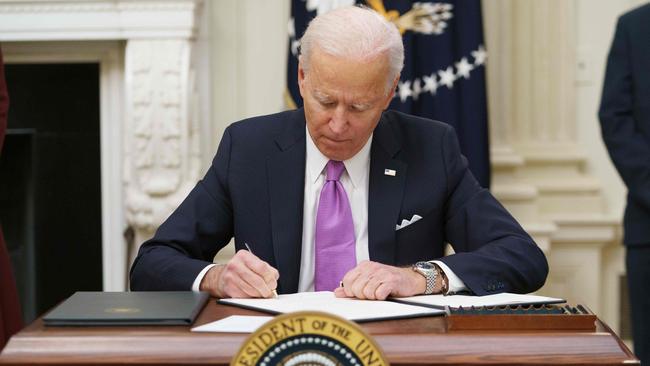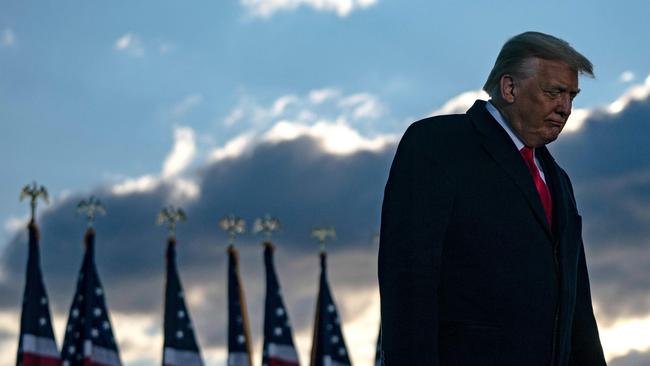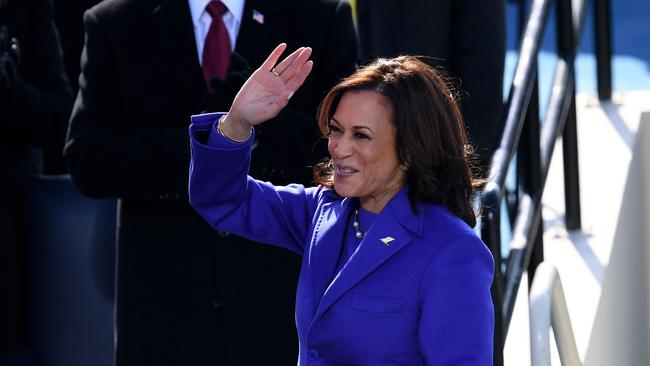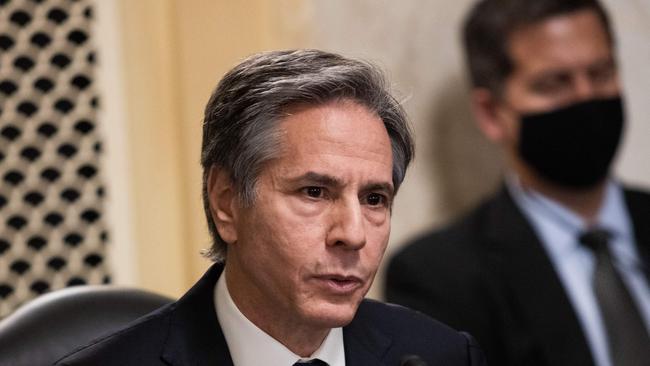
His inauguration speech, with its clarion call for unity, has been widely praised, even by his opponents. His first steps as America’s 46th President have been sure-footed as he delivers on his promise to unwind as much of Donald Trump’s legacy as he can with the stroke of a pen.
As he walked hand-in-hand into the White House with his wife and now First Lady Jill Biden, opinion polls showed that he is enjoying an approval rating of almost 60 per cent, far higher than anything Trump achieved over four years.
Biden’s Washington is awash with blue as the Democrats find themselves in control of both houses of congress for the first time in a decade.
And the 78-year-old veteran politician has surrounded himself with White House advisers and a cabinet steeped in experience and knowledge of the ways and whims of power in the national capital.
He has also broken historic ground by choosing the country’s first female and first black Vice-President in Kamala Harris.
By contrast, his vanquished opponent left Washington as a sore loser, disgraced by his final months, petulant till the end and with his approval ratings at a rock-bottom 34 per cent, the lowest of his presidency.
Trump also leaves behind a deeply divided Republican Party that is split between his brand of populism and a return to old-style conservatism. Hovering above all Republicans is the mystery of Trump’s intentions. Will he seek to remain a kingmaker for American conservatives, or will he soon become yesterday’s man, more interested in business and golf than politics?

And yet, for all of Biden’s advantages right now, he faces dire challenges on multiple fronts, each of which could easily puncture his political honeymoon.
He inherits office at a perilous time for America as it faces its worst health crisis in a century, a battered economy and the most bitter political divisions since the civil rights era.
“Like Lincoln, Biden comes to power at a moment when the country is torn between conflicting visions of reality and identity,” says Jon Meacham, a presidential historian who contributed to Biden’s inaugural address.
“Too many Americans have been shaped by the lie that the 2020 election was somehow stolen,” he says. “The new President’s challenge — and opportunity — is to insist that facts and truth must guide us; that you can disagree with your opponent without delegitimising that opponent’s place in the republic.”
Biden’s decision to focus his inauguration speech on a call for unity, healing and tolerance rather than on his policies speaks volumes about how precarious this moment is for America.
Trump’s repeated unsubstantiated claims that Biden won the election through widespread voter fraud, which culminated in the deadly storming of the Capitol two weeks ago, have left a toxic legacy. Trump’s dangerous mischief has helped persuade a third of Americans that Biden did not win office fairly and therefore is an illegitimate president.
Biden could not have done more in his inauguration speech to send an olive branch to the 74 million people who voted for Trump, including those who believe in Trump’s conspiracy theories.
“We must end this uncivil war that pits red against blue, rural versus urban, conservative versus liberal,” said Biden. “Politics doesn’t have to be a raging fire destroying everything in its path.”
It was a speech that called for, and almost begged for, peace — in stark contrast to Trump’s declaration of war on the establishment four years earlier when he spoke of “American carnage”, “stolen” jobs and a corrupt Washington “swamp”.
Former Republican president, George W Bush, who said of Trump’s 2017 speech “that was some weird shit”, has publicly backed Biden’s call for unity, telling the Democrat: “I’m pulling for your success.”
But Biden’s hopes for an outbreak of peace may only be partly achievable in today’s America.
While Trump’s presidency inflamed and deepened the country’s political, economic and social divide, it did not create it. It was that divide between the haves and the have-nots, between city and country, between traditional rural values and modern identity politics, that led to Trump being elected in the first place.
Biden’s challenge will be to reach out to those disaffected voters through a centrist, moderate agenda without alienating the restless left wing of the Democrats, who will be energised by controlling both houses of congress.
It is a precarious balance for Biden as he navigates enemies from both the right and the left.
The influence of the Democrats’ resurgent left wing could be seen in parts of Biden’s inauguration address with phrases such as the “string of systemic racism” and his call for climate change to be a top priority of his administration.
Biden has moved fast to sign a raft of executive orders to reverse key parts of Trump’s legacy.
“We’ll press forward with speed and urgency, for we have much to do in this winter of peril and possibility,” he said.
These include rejoining the Paris Climate Accord and the World Health Organisation, halting construction of the US-Mexico border wall, and targeting policies that eased regulation for business at the expense of the environment.
Already, some Republicans are angered by the moves, claiming they will cost the jobs and livelihoods of working families.
“Biden’s policies from day one hurt American workers and our economy,” said Wyoming Republican Shelley Moore Capito.
“This virtue signalling comes at the expense of low-income and rural families that rely upon industries opposed by liberal environmental groups.”
But there are limits to what Biden can achieve with executive actions. To pass more substantial parts of his agenda — including his $US1.9 trillion ($2.45 trillion) coronavirus-relief package and his sweeping immigration reform package — he needs congressional approval.
Biden has raised the eyebrows of some with his claim that he can reach across the aisle and do business with Republicans in this era of entrenched partisanship.
Although the Democrats control both houses of congress, they have only a narrow majority in the House and they only control the 50-50 Senate because Harris, as Vice-President, has the casting vote in any tie.
Biden has a longstanding relationship with the now Republican Senate Minority Leader Mitch McConnell, but whether Biden can make this translate to real and substantive legislative achievements remains to be seen.
In reality, Biden is likely to have only a two-year window to pass any important legislation in congress. Midterm elections in the US, held two years after the presidential election, traditionally see a swing against the sitting president. Even a small swing would rob Democrats of control of the Senate and possibly even the House.
But Biden’s call for greater political unity, both outside and inside congress, faces an immediate challenge with Trump’s looming impeachment trial in the Senate.
Democrat House Speaker Nancy Pelosi has not flagged when she will send the article of impeachment for Trump’s incitement of insurrection to the Senate for a trial. But it could be as early as this coming week — pitting Senate Democrats and Republicans against each other in a second impeachment trial of the now former president.
Democrats are wary of a Senate trial disrupting Biden’s agenda at a time when he is trying to win Senate confirmations of his cabinet and also support for his coronavirus and immigration packages.
To minimise such disruption, Democrat senators are reportedly discussing holding a lightning-fast impeachment trial — possibly even as short as three days — compared with previous trials which have ranged in duration from 21 to 83 days.
Although almost no Republicans backed Trump’s actions in inciting his supporters ahead of their storming of the Capitol, it seems unlikely that Democrats will win the votes of the 17 Republican senators they need in order to convict Trump.
So far, only about six Senate Republicans have openly criticised Trump, and the only chance for a conviction appears to lie with McConnell, who is considering voting to convict Trump and who may bring other Republicans with him across the aisle if he does.
After just a couple of days in office, the Biden administration is showing itself to be the polar opposite of the Trump White House, in both style and substance.
Biden has taken immediate steps to combat the coronavirus pandemic in a way that Trump never did, by launching a major national strategy to make tests and vaccines more available, reopen schools safely and develop more therapeutics to treat COVID-19.
His mandate that face masks must be worn on federal property at all times is a science-first approach to reduce the spread of the virus, which is still surging out of control, having infected 25 million Americans and killed more than 400,000.
It is a sharp contrast to Trump, who disliked face masks and used the issue as a partisan tool to attack and ridicule Democrats, despite clear evidence that they work to reduce infections.
The experience of those in the Biden White House is also a sharp contrast to the inexperienced outsiders Trump appointed.
Biden’s choices of Antony Blinken as Secretary of State, Ron Klein as chief of staff, Janet Yellen as Treasury Secretary and Jake Sullivan as National Security Adviser bring with them vast experience and a keen understanding of how Washington works.
Contrast that with Trump’s early White House appointments such as Steve Bannon and Michael Flynn, who eventually had to be pardoned by Trump in order to avoid jail.
Biden’s team have made it clear they want to move away from the isolationist America First foreign policy approach of the Trump White House and pay more attention to Washington’s traditional allies, including Australia.

Biden has flagged a greater leadership role for the US abroad, including in multilateral forums, and a tougher approach to authoritarian regimes such as Russia and North Korea.
The new President has also promised to adopt a tough stance against China, although it will be a more nuanced one than that of the Trump White administration.
Nowhere has the early contrast between the two administrations been clearer than in the media briefing room. Trump’s first press secretary Sean Spicer began his tenure with a great big lie, saying Trump’s inauguration crowd was the largest in history — a claim that was easily disproved by photographic comparisons.
This week, Biden’s press secretary Jen Psaki made it clear that she would not be peddling “alternative facts” to the media.
“(Biden’s) objective and his commitment is to bring transparency and truth back to government and to share the truth even when it’s hard to hear,” she said, “and that’s what I hope to do.”
Whereas Trump came to the presidency with little understanding of the nature and limits of the role, Biden brings a wealth of experience with him after 36 years in the Senate and eight years as vice-president to Barack Obama.
For Biden, his inauguration is the culmination of a lifetime of public service. But at 78, will he have the drive, determination and the diplomatic skills needed to bring America’s warring political tribes closer together?

Few Americans would doubt the timely nature of his call for unity. Even legendary Republican strategist Karl Rove said of Biden’s inauguration address: “This was a great speech … it was, for the moment, exactly what I think the American people needed to hear.”
The question is whether Biden can go beyond his stirring words to actually “lower the temperature” and end the country’s “uncivil war”. Or does this new President harbour a utopian dream that belongs to another era. Is America too broken, too partisan and too entrenched to ever be unified again in the way that Biden hopes?
For now, at least, Americans are happy to revel in the optimism of their new President. They are hopeful that maybe, just maybe, he can be the soothing voice and the agent of change the country needs to start healing.
As Biden said at his inauguration: “Today we marked the swearing-in of the first woman in American history elected to national office — Vice-President Kamala Harris. Don’t tell me things can’t change.”




This is Joe Biden’s moment.